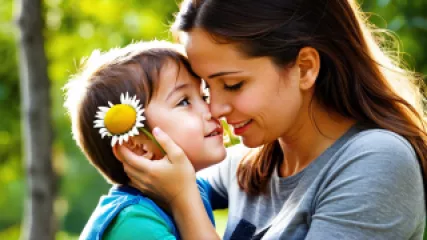Fostering Emotional Intelligence in Children Through Positive Parenting
It was a warm summer day when I first became a parent. Holding my newborn in my arms, I felt a wave of love, joy, and responsibility wash over me. As I embarked on this incredible journey of parenthood, I realized that one of the most important things I could do for my child was to foster their emotional intelligence.
The Power of Emotional Intelligence
Emotional intelligence, often referred to as EQ, is the ability to recognize, understand, and manage our emotions and the emotions of others. It plays a crucial role in our overall well-being, relationships, and success in life. Research has shown that individuals with higher EQ tend to have better mental health, stronger interpersonal skills, and greater resilience.
As parents, we have the opportunity to promote emotional intelligence in our children from an early age. By providing a nurturing and supportive environment, we can help them develop the skills they need to navigate their emotions, build healthy relationships, and thrive in life.
The Role of Positive Parenting
Positive parenting is an approach that focuses on building a strong parent-child relationship based on mutual respect, empathy, and open communication. It involves setting clear boundaries, providing consistent discipline, and offering unconditional love and support. By practicing positive parenting, we can create an environment that encourages emotional growth and fosters the development of EQ in our children.
1. Nurture a Secure Attachment
Building a secure attachment with your child is the foundation for their emotional well-being. Responding to their needs promptly, offering comfort and reassurance, and creating a safe and loving environment will help them feel secure and develop trust. This secure attachment forms the basis for their future relationships and emotional development.
2. Encourage Emotional Expression
It's important to create a space where your child feels comfortable expressing their emotions. Encourage them to identify and label their feelings, and validate their experiences. Avoid dismissing or minimizing their emotions, as this can discourage open communication and hinder their emotional growth. Instead, offer empathy and understanding, helping them develop the skills to manage and regulate their emotions.
3. Teach Problem-Solving Skills
Help your child develop problem-solving skills by involving them in age-appropriate decision-making processes. Encourage them to think critically, consider different perspectives, and explore various solutions. By empowering them to solve their own problems, you are fostering their independence and building their confidence in their ability to navigate challenging situations.
4. Promote Empathy and Compassion
Empathy is a key component of emotional intelligence. Teach your child to understand and empathize with the emotions of others. Encourage acts of kindness, teach them to take turns, and model compassion in your own interactions. By promoting empathy, you are helping your child develop strong interpersonal skills and nurturing their ability to build meaningful connections with others.
5. Practice Effective Co-Parenting Strategies
If you co-parent with a partner, it's essential to work together to create a consistent and supportive parenting approach. Effective co-parenting involves open communication, mutual respect, and shared decision-making. By presenting a united front, you provide your child with a stable and nurturing environment, which is crucial for their emotional well-being.
Parenting Support Groups: A Source of Guidance and Inspiration
Parenting can sometimes feel overwhelming, and it's natural to seek support and guidance along the way. Parenting support groups can be an invaluable resource for sharing experiences, gaining insights, and finding encouragement. These groups provide a safe space to discuss challenges, exchange tips, and learn from other parents who are on a similar journey.
Whether it's joining an online community or attending local parenting workshops, connecting with other parents can offer a sense of belonging and reassurance. It's an opportunity to learn new strategies, discover different perspectives, and build a network of support.
In Conclusion
As parents, we have the privilege and responsibility to foster emotional intelligence in our children. By practicing positive parenting, we can create an environment that nurtures their emotional growth and equips them with the skills they need to navigate life's challenges. Through nurturing secure attachments, encouraging emotional expression, teaching problem-solving skills, promoting empathy, and practicing effective co-parenting strategies, we lay the foundation for their emotional well-being and future success.
Remember, fostering emotional intelligence is an ongoing journey. Each day presents new opportunities for learning, growth, and connection with your child. Embrace the journey, celebrate the small victories, and savor the precious moments shared along the way.






